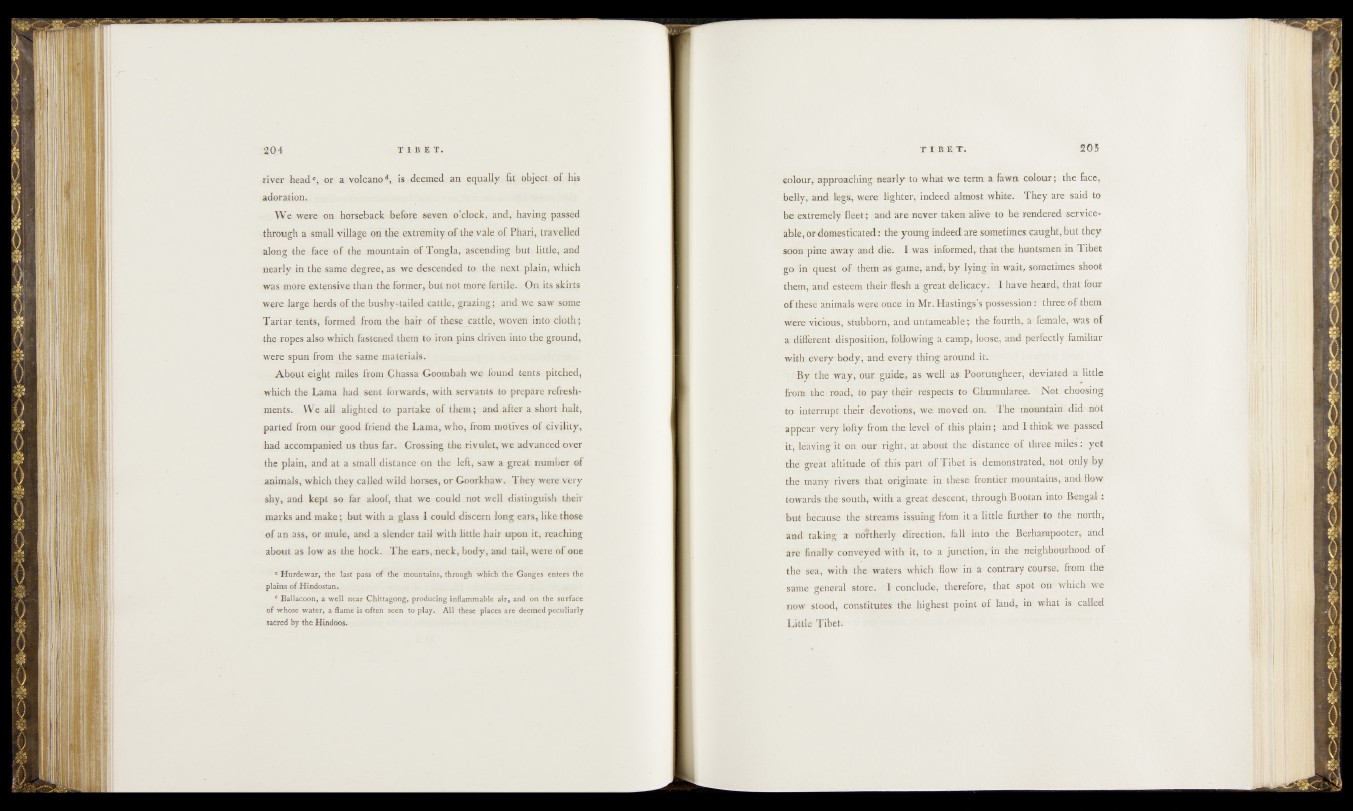
river head®, or a volcano4, is deemed an equally fit object of his
adoration.
We were on horseback before seven o’clock, and, having passed
through a small village on the extremity of the vale of Phan, travelled
along the face of the mountain of Tongla, ascending but little, and
nearly in the same degree, as we descended to the next plain, which
was more «tensive than the former, but not more fertile** On its skirts
were large herds of the bushy-tailed cattle, grazing; and We saw some
Tartar tents, formed from the hair of these cattle, woven into doth,;
the ropes also which fastened them to iron pins driven into the ground,
were spun from the same materials.
About eight miles from Chassa Geombafa we found tents pitched,
which the Lama had sent forwards, with servants to prepare refreshments.
We all alighted to partake of them; and after a short halt,
parted from our good friend the Lama, who, from motives of civility,
bad accompanied us thus far. Crossing the rivulet, we advanced oyer
the plain, and at a small distance on the left, saw a great number of
animals, which they called wild horses, or Goorkhaw. They were, very
shy, and kept so far aloof, that we could not well distinguish their
marks and make; but with a glass 1 could discern long ears, like those
of an ass, or mule, and a slender tail with little hair upon it, reaching
about as low as the hock. The ears, neck, body, and tail, were of one
•* Hurdewar, the last pass of the mountains, through which the Ganges enters tne
plains of Hindostan.
d Ballacoon, a well near Chittagong, producing inflammable air, and on the surface
of whose water, a flame is often seen to play. All these places are deemed peculiarly
sacred by the Hindoos.
colour, approaching nearly to what we term-a fawn colour; sthe fece,
belly, and legs, wete■ iighfeT, indeed almost white. They sate said: to
be extremely fleet; and awe never taken alive: to ltoe'rendered: serviceable,
or domesticated: the young indeed area«tHetnoest«ang&;bdt they
soon pine away and die. I whs. informed-,’ that the bammmen imTilset
go is quest of them asi game, and, by lyhsg'm wait, sometimes shoot
them, and esteemtheirftesh as great delicacy. I have heard!itfeat four
of these a™mats, were- omee m Mr. jjastoaffl’s possession: three of feheifi
were vicious, stubborn, and untameadble; the fcuitb^vasfesasile, .-Was ®f
a, different disposition, foHowiiag h camp, base, amd perfectly femikaE
with: every body, and every thing around it.
By abe way, qur: guide, as well! as Fposnaglbeer, deviated ai little
fromrtfetiiead, to pay their respects to Chumularee. I'tot-eho®®^
to interrupt; their devotions, we moved one The mountain dirfmot
appear very fofty from tha level &f %Ub plain; and I think wu.passed
it, IdafifiE^'it'on, onr- right, at about the distance of three-miles.: yet
tHe great altfende of this part of Tibet is demonstrated, not only by
the many rivers that: originate-, in. these frontier mountains, and-flow
towards the south, with a great .descent, through Baotan irntto Bengai:
hut because, the streams issuing from it a, little further to the -naiith;
and taking a northerly direction, fell into- the Bertiafapootev# dad
are finally conveyed: With it; to. a. junetion,-'in the neighhourhood' of
the sea, with the waters which flow in a contrary course;, from, the
same general store.- I* conefettfe, therefore, that spot ’©it ywhicbtwe
now stood, constitute» the highest point of land, h what is. called
Little Tibet.